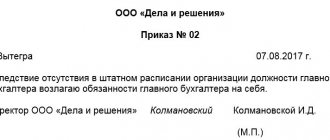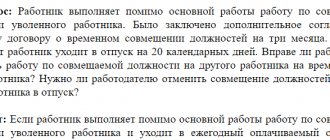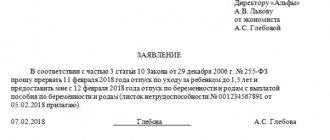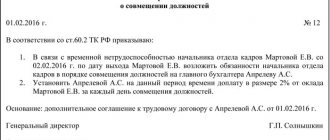The CEO is also a person and periodically has the right to go on vacation. During this period, you should not leave the company headless; it is wiser to transfer the managerial powers to another employee. This collection tells you how to do it correctly. It is also advisable to do this because the general director being on vacation is not a reason to stop the inspection, extend the official period, and so on. This is illustrated with examples from judicial practice. But if the general director still wants to retain the reins of management while on vacation, then at the beginning of the selection he will find an explanation why he has every right to do so.
The CEO can work while on vacation if he wants
As a rule, if a CEO goes on vacation, it is to relax, not to work.
Therefore, he temporarily delegates authority to his deputy or another employee. At the same time, situations are possible when the manager wants to work while on vacation. Let's say he will have time to do work, but he doesn't want to trust the company to anyone else, even for a couple of weeks.
Then the question arises: does the CEO have the right to work on vacation? Will he have the right to remotely give instructions to his subordinates, and will the documents signed by him during his annual leave have legal force?
The Labor Code states that annual leave is one of the types of rest time during which the employee is free from performing work duties and which he can use at his own discretion (Articles 106, 107, 114).
It would seem that the performance of labor duties is excluded by this norm, but this is not so.
The term "free" means freed. Freed from what? Obviously, since it is impossible to be exempt from rights, they are usually deprived of duties, but this is not the case.
This means that any employee, including the general director, is not obliged to work on vacation and the owners of the company cannot force him to do so.
Further in this norm it is written that the employee can use vacation time at his own discretion. Can you extend your discretion to work?
Why not? After all, this norm does not contain a ban on working on vacation. But he could. For example, weekends and non-working holidays are also a type of rest, but in relation to them the code directly states that working on these days is prohibited. An employee can be engaged to work during this time only with his written consent and only if it is necessary to perform unforeseen work (Article 113).
Conclusion: the CEO can work while on vacation.
Another argument in favor of this: working during a period of release from service for a certain period of rest is the same as working during a lunch break.
It is also a type of recreation; in relation to it, the code also does not contain a prohibition to work (Article 108). It is hardly possible to imagine that someone would demand that a document signed by the director during lunch be declared void. Nonsense. The situation is similar with vacations. Argument three: this conclusion is confirmed by the courts. In their opinion, the current legislation does not provide for a ban on an employee performing his official duties while he is on regular leave (Resolution of the Federal Antimonopoly Service of the Moscow District dated May 24, 2010 No. KA-A41/5089-10, Determination of the St. Petersburg City Court dated May 2. 2012 No. 33-6076/2012, Appeal ruling of the Supreme Court of the Republic of Sakha (Yakutia) dated January 14, 2015 No. 33-4778/2014).
Moreover, the judges believe that while on vacation, the powers of the general director are retained even if an acting officer is appointed. Therefore, the signing of a transaction by the manager during this period is not grounds for declaring it invalid (resolutions of the Arbitration Courts of the Moscow District dated October 4, 2017 No. F05-12743/2017, Volga District dated January 14, 2010 No. A12-6003/2009, North Caucasus District dated January 12 .2010 No. A32-408/2009).
Summary: the fact that the head of the company is on vacation does not deprive him of the rights and powers to act on behalf of the company, to represent its interests in all matters determined by law. Any documents signed on behalf of the company by the director have full legal force.
But if he still wants to delegate his powers...
What powers can be delegated and to whom?
The manager has the right to represent the interests of the company without a power of attorney - in courts, in state and municipal organizations, during business negotiations, and in other situations. Before transferring your powers for a certain period to another employee, you need to check the possibility of such actions in the constituent documents. In accordance with Art. 20 of the Labor Code of the Russian Federation, the director may delegate his duties to the following persons for a certain period:
- subordinates;
- manager;
- to his immediate deputy;
- other authorized persons.
It is not necessary to delegate all of your responsibilities to one employee. For example, the Board of Directors may be delegated authority to prepare meetings. And the chief accountant has the right to sign, if he does not have one.
The transfer of powers of the general director is formalized by order
The head of the LLC, going on vacation, issued an order “On the temporary performance of duties,” assigning his duties to another employee.
One of the two participants in the company, who has a 50 percent share in the authorized capital, did not agree with the order. In his opinion, the competence to appoint a manager, both permanent and temporary, belongs only to the general meeting of company participants. This is stated in Art. 40 of the LLC Law.
Motivating in this way, the founder demanded that the court declare the said order invalid.
However, the court refused.
The arbitrators made it clear that no one disputes the right of the general meeting of participants to appoint a sole executive body. At the same time, the authority to appoint a temporary deputy may be granted to the general director by the charter of the LLC.
In this case, the company’s charter states that the powers of the general director of the company include, among other things, the issuance of orders on the appointment of company employees to positions, on their transfer and dismissal. Thus, the charter provides that for the period of his temporary absence (including during vacation), the general director appoints an acting director. Such an appointment is formalized by order.
Consequently, by issuing the contested order, the general director acted within his competence and lawfully gave another employee the right to exercise the powers of the sole executive body of the company. This decision does not violate the requirements of the LLC law.
Resolution of the Federal Antimonopoly Service of the Volga Region dated July 2, 2013 No. A12-25625/2012
Editor's note:
However, one order will not be enough to delegate all the powers of a manager. It gives the acting general director only the labor rights of a boss. To carry out transactions, a power of attorney is still required. This is emphasized in judicial practice: judges write that from the content of the order, according to which the director assigned the duties of the general director to the acting director, it does not follow that the latter was vested with the authority to carry out transactions on behalf of the company (Resolution of the Arbitration Court of the Central Vacation dated 02.02.2015 No. F10-4918/14).
If there is no full-time deputy
Often, in small organizations and individual entrepreneurs there is no full-time deputy. In this case, powers can be transferred to one of the heads of departments to combine positions. Before issuing an order, you need to sign an agreement that will be an addition to the employment contract. It specifies the duration of the duties of the director and the amount of additional payment due.
The boss in the order to combine positions must indicate:
- the specific powers of the deputy (i.e. what work he will have to do and to what extent);
- deadlines for the deputy to fulfill his powers;
- specific amount of surcharge;
- whether the deputy has the right to sign financial documents.
The law does not impose specific requirements on the person acting as chief. However, his qualifications must be high so that he can competently manage the business.
Another option is an employee who does not combine his position with the responsibilities of a manager, but is temporarily transferred to such a position. The translation procedure is prescribed in Art. 72.2 Labor Code of the Russian Federation. Such a transfer can be for a period of up to one year. But if the period has expired and the replacement employee was not given the previous job, then the transfer automatically turns into a permanent job.
Do not forget that when an employee is transferred to a replacement position, the area of work he performs is freed up. So, you will have to look for another person to take his place. Therefore, transferring an employee is not very convenient and requires a lot of effort.
The transfer of powers is also formalized by a power of attorney
The general director of the OJSC issued another employee with a notarized power of attorney to exercise his powers, including the right to sign accounting and other reporting documents on behalf of the company as required by current legislation.
The shareholders filed a lawsuit to declare this power of attorney invalid. They referred to the fact that it, as a unilateral transaction made by the company, is invalid on the grounds specified in Art. 173, 174 of the Civil Code of the Russian Federation, since it was committed without the consent of the legal entity and to the detriment of the interests of society. There were also circumstances that indicated unfair joint actions of the representative and the general director to the detriment of the interests of society.
However, the court rejected the claim, deciding that the issuance of a power of attorney by an unauthorized person was not proven, as well as a violation of the rights of shareholders by issuing the controversial power of attorney.
Resolution of the Arbitration Court of the Central District dated January 15, 2018 No. F10-5609/2017
Editor's note:
To be fair, we note that the courts do not have a consensus on whether the general director has the right to issue a power of attorney to the acting person without receiving permission from the general meeting of participants or shareholders. Some judges still believe that such permission is necessary and without it the power of attorney is invalid (Resolution of the Arbitration Court of the Moscow District dated January 17, 2019 No. F05-22748/2018).
To avoid disagreements, it is necessary to specify in the company's charter who exactly has the authority to appoint an acting general director during his next vacation - the general director or the general meeting of participants (shareholders).
Power of attorney for the general director
In addition to the order, it is necessary to make a power of attorney to transfer all (or part) of the manager’s powers. It is needed if, according to the organization’s charter, it is not possible to transfer powers in the absence of the boss.
A power of attorney is issued on company letterhead with certain details. It provides information on the validity period, date of issue, to whom it was issued, the composition of the powers, and the signature of the current head of the company. If the power of attorney does not specify a period, it is valid for one year from the date of issue. All requirements and rules for the preparation of such documents are specified in Articles 185 and 186 of the Civil Code of the Russian Federation.
The power of attorney must necessarily have the signature of the manager, the date of signing and a seal if the company works with it.
Keep in mind: without a power of attorney, during the absence of the boss, the organization will not be able to operate uninterruptedly; payments of salaries, vacation pay and sick leave will be suspended. An authorized deputy, having an official document, will be able to manage the company’s money and make the necessary purchases, sales, and sign important papers.
The power of attorney can be revoked by the boss at any time. The employee to whom it was issued also has the right to refuse it. But not in the case of an irrevocable power of attorney (Article 188.1 of the Civil Code of the Russian Federation). It can only be canceled in certain cases.
The CEO being on vacation is not a reason not to allow inspectors into the office
Representatives of the Federal Accreditation Agency visited the company for an unscheduled on-site inspection.
The organization was a testing laboratory, and in relation to it this government agency was authorized to carry out control measures. However, the company’s employees refused to allow department officials to enter their territory, blocked their access to the premises and did not allow them to familiarize themselves with the required documents.
They motivated their actions by the fact that the general director was on vacation. In his absence, no one else is authorized to represent the interests of the organization during the audit.
The inspectors did not agree with this argument and drew up a protocol against the organization under Part 2 of Art. 19.4.1 Code of Administrative Offenses of the Russian Federation for obstructing an inspection. The judge imposed a fine of 30 thousand rubles.
The company challenged it, but to no avail.
The courts rejected the argument about the director’s leave, pointing out that in violation of the requirements of Part 5 of Art. 12 of Law No. 294-FZ, the company did not fulfill its obligations and did not provide officials of the regulatory body with the opportunity to conduct an inspection.
Resolution of the Moscow City Court dated March 11, 2019 No. 4a-363/2019
Editor's note:
The courts agree on this and emphasize that the main thing is that the company is promptly and properly notified of the date, time and place of the inspection. In this case, she is obliged to provide the opportunity for it to be carried out, including ensuring that either the manager or any other person authorized by him is present on site (decrees of the Samara Regional Court dated 06/05/2017 No. 4a-529/2017, Moscow City Court dated 19.09 .2016 No. 4a-4800/2016, court of the Khanty-Mansiysk Autonomous Okrug - Ugra dated August 27, 2014 No. 4-a-409/2014).
Power of attorney for the duration of the manager's illness
If the director is sick, he can also delegate his authority to another employee. As a rule, a power of attorney is issued to the first deputy or chief accountant. These employees know the management of the enterprise better than others. If the illness is serious, and the director does not have the opportunity to sometimes be present at the enterprise and resolve management issues, it is recommended to delegate all powers - from signing documents to negotiating with partners. A power of attorney for the transfer of responsibilities can only be issued in writing.
The CEO being on vacation is not a reason to extend the period for appeal
The general director of the company, as an official, was fined under Art.
15.19 of the Code of Administrative Offenses of the Russian Federation for violation of legal requirements relating to the presentation and disclosure of information on financial markets. From the date of delivery or receipt of a copy of the decision, he had 10 days to appeal (30.3 of the Code).
However, he missed this deadline and filed a complaint later. At the same time, his lawyer, who filed a complaint with the court, asked that the reason for missing the deadline be recognized as valid - the general director and the lawyer were on vacation.
The judges refused. They decided that being on vacation does not indicate the impossibility of timely exercise by a person brought to administrative responsibility of the right to appeal a decision in a case of an administrative offense.
There is no other evidence confirming the validity of the reasons for missing the deadline for appeal provided by law.
Thus, the general director had no objective obstacles to filing a complaint in a timely manner.
Resolution of the Supreme Court of the Russian Federation dated March 6, 2019 No. 78-AD19-3
Editor's note:
This is a typical position of judges. They do not recognize the CEO's vacation as a valid reason for missing a deadline. In particular, because such a position is set out in paragraph 10 of the Resolution of the Plenum of the Supreme Court of the Russian Federation dated December 11, 2012 No. 29 (resolution of the Arbitration Courts of the Moscow District dated February 28, 2018 No. F05-2450/2018, Volga District dated September 23, 2015 No. F06- 580/2015, East Siberian District dated 08/31/2011 No. A78-7255/2010).
How to delegate authority
The director may delegate all or part of his powers during his absence. To do this, you need to draw up a power of attorney. A simple written form is sufficient; notarization is not required. The director (the position may be called differently) independently certifies the trust document with his signature and seal of the organization. He has such a right; it is stated in the constituent documents. As a rule, powers are transferred to the first deputy if such a position is provided for in the staffing table. The deputy's responsibilities for “replacing” the manager may be specified in the job description. In this case, powers are transferred automatically - there is no need to issue additional orders. Without execution of a power of attorney, no additional payment is due for the temporary performance of the duties of a manager. The director has the right to independently issue a bonus or make an additional payment. If execution of a trust document is required, the deputy will need to pay extra. If a manager delegates part of his powers to another employee, an order will be sufficient. Such a norm will be competent if there is no need to delegate the right to sign. If there is such a need, then a power of attorney is needed.
Can the CEO make his own decisions?
Perhaps the consent of the founders of the enterprise or members of the company is not required. The possibility of delegating the powers of a director is provided for in the constituent documents. The manager is the only executive body at the enterprise. He has the right to transfer his powers in full or only partially to another employee during his absence.
Issuance of an order
In this way, you can delegate the powers of any employee only when there is no need to transfer the right to sign. For example, a proxy may be present at negotiations and make oral decisions, but cannot sign any documents. This option is possible if the manager’s responsibilities are transferred for a short period of time or the director is physically available. For example, on sick leave. You can come to his home and sign the papers or transfer them by e-mail if the company uses electronic document management.
We issue a power of attorney
A trust document for the transfer of powers is required if the manager transfers the responsibilities for signing documents to a trustee. This includes the right to sign orders for the bank, contracts, orders and other things. The director also has the right to set restrictions. For example, an acting official can sign orders, cash sheets, but does not have the right to sign bank documentation - payment orders, checks, etc. These responsibilities can be delegated to the chief accountant. The specifics of the activity allow you to understand more about financial issues. The power of attorney is drawn up in writing. It is recommended to issue it for the period while the manager is absent. If this period of time is not clear, it can be issued for any period. The main condition is to indicate the date of registration. Without this information, the power of attorney will be considered invalid.
Disposal of non-cash funds
Any banking document requires the signature of the manager. Additionally, an order may appoint another employee with the right to sign financial and banking documentation. As a rule, this is the chief accountant. If such a person with the right to sign is designated, but during the absence of the director there is no need to draw up an order or power of attorney. The disposal of non-cash funds of the enterprise occurs through a payment order. Signed by the director or chief accountant, additionally certified by the seal of the organization. A sample signature of the manager is kept in the bank. If the constituent documentation entrusts the right to sign bank papers to another employee, a sample of his signature should also be in the bank. If only the director has the right to sign bank orders, then during his absence he can delegate the authority to manage non-cash funds to another employee. This can be done through a power of attorney. It is enough to issue a trust document in simple written form. There is no need to have it certified by a notary. A power of attorney for the transfer of authority to manage non-cash funds of the enterprise is transferred to the bank. While the director is absent, the attorney can sign orders for the bank.
The CEO being on vacation is not a reason to delay execution of the order
The Federal Service for Financial Markets issued a fine of 500 thousand rubles to the company for failure to comply with a previously issued order.
Considering this resolution illegal, the company appealed to the arbitration court.
As one of the arguments in favor of canceling it, the company pointed out that it was impossible to fulfill the order on time due to the absence of the general director - he was on vacation at that time.
The court rejected this argument, since this circumstance is of an internal organizational nature for the company.
At the same time, another argument worked: the administrative body committed a significant violation of the order and procedure for holding the company accountable - based on the results of the consideration of the case, it announced only the operative part of the resolution, but issued it in full two days later and another five days later sent the resolution to the company.
This is a violation of Part 1 of Art. 29.11 of the Code of Administrative Offenses of the Russian Federation, by virtue of which the resolution is announced immediately upon completion of the consideration of the case.
The norms of the code do not provide for the possibility of announcing only the operative part of the resolution and subsequently making it in full. This conclusion corresponds to the legal position set out in paragraph 29 of the Resolution of the Plenum of the Armed Forces of the Russian Federation dated March 24, 2005 No. 5.
Consequently, such a procedural action as “announcing the operative part of the resolution” and “making the resolution in full” is a significant and irreparable violation, leading to the impossibility of determining the exact date of the resolution.
In accordance with paragraph 4 of Part 1 of Art. 30.7 of the Code of Administrative Offenses of the Russian Federation, this serves as a basis for canceling the decision in the case.
Resolution of the Federal Antimonopoly Service of the Moscow District dated May 12, 2014 No. F05-2992/14
How to draw up a power of attorney for the general director's vacation, sample
It is necessary to pay attention to the constituent documents. They usually prescribe the rules for transferring managerial responsibilities to another person during the absence of the first one. You need to act in accordance with the established algorithm. A power of attorney can only be issued in writing (oral transfer of powers is not provided). Notarization is not required; the signature of the general director himself is sufficient.
The following information must be reflected:
- Name, date and place of compilation. The date must be indicated; without this, the power of attorney will be considered invalid.
- Information about the director (the position may be different) and the employee to whom he transfers his responsibilities.
- The length of time during which the power of attorney will be considered valid. For example, a manager goes on vacation for 2 weeks. At this time, it is necessary to draw up a paper not transferring authority.
- Delegated responsibilities. It is not necessary to transfer them all. If the vacation is short, then some things can be left until you return.
- An indication of the possibility of transfer of trust and the lack thereof.
- Date of preparation.
- Director's signature.
- “Living” seal of the organization.
The general director being on vacation is a reason to cancel the protocol and resolution
The FMS fined the company 400 thousand rubles for violating migration norms (Part 4 of Article 18.9 of the Administrative Code of the Russian Federation).
The organization appealed to the court with a demand to declare the decision illegal and cancel it, since on the day the protocol was drawn up, the general director was on vacation. The company sent a message about this to the FMS, further explaining that he did not leave a power of attorney for anyone. But officials ignored this message.
The judges supported the company and canceled the fine, deciding that the prosecution procedure was violated, since the protocol was drawn up in the absence of a legal representative of the company.
As justification, the judges referred to the provisions of Art. 28.2 of the Code of Administrative Offenses of the Russian Federation, which requires the participation of a legal representative of a legal entity in drawing up a protocol, as well as clause 24 of the Resolution of the Plenum of the Supreme Arbitration Court of the Russian Federation dated June 2, 2004 No. 10, which instructs government agencies to take sufficient measures to notify the person against whom a case of an administrative offense has been initiated, or his legal representative on drawing up a protocol in order to ensure the opportunity to exercise the rights provided for in Art. 28.2 Code of Administrative Offenses of the Russian Federation.
The arbitrators emphasized that since the general director of the company, due to being on vacation, was not notified of the preparation of the protocol, he did not have the opportunity to issue a power of attorney to represent the interests of the company to any other employee of the company.
Resolution of the Federal Antimonopoly Service of the Moscow District dated April 20, 2011 No. KA-A40/3167-11
Editor's note:
This decision was made before the release of the Resolution of the Plenum of the Supreme Court of the Russian Federation dated December 11, 2012 No. 29, mentioned in a note to one of the previous reviews, which called the CEO’s leave a purely organizational problem of the company itself. Perhaps that is why in this case the judges still sided with the company. Although there is one more argument that is significant: the Resolution of the FAS of the Moscow District concerns the Code of Administrative Offenses of the Russian Federation, while the Resolution of the Plenum of the Supreme Court of the Russian Federation explains the norms of the Arbitration Procedure Code of the Russian Federation. [/box]
Sample power of attorney
POWER OF ATTORNEY
to represent the interests of the organization
"____"________________ G. ________________
LLC "___________" represented by director _______________, acting on the basis of the Charter, this
(name) (full name)
authorizes the deputy director _______________________ with a power of attorney, passport series _________
(FULL NAME)
No. _______, issued by “____”_________________ __________________ District Department of Internal Affairs of the city ___________, to represent the interests of LLC “________________” to conduct business in institutions, enterprises, organizations, to enter into business transactions
(Name)
contracts, receive all necessary documents, put your signature on all necessary documents, including the contract, perform other actions and formalities related to the conduct of business activities of ______________ LLC.
(Name)
(Options: accept, transfer inventory, sign transfer deeds, conduct purchases, open (close) bank accounts, etc.).
The powers under this power of attorney cannot be transferred to other persons.
The power of attorney is valid on __________________________.
(date is written in words)
I hereby certify the signature _____________________ _____________________________________________________.
(signature is placed) (full name of the person whose signature is being verified)
Director ___________________
The power of attorney is issued in simple written form, signed by the director or other person authorized to do so by the organization’s charter, and sealed with the organization’s seal (clause 5 of Article 186 of the Civil Code). Such a power of attorney is not required to be notarized.
After proper transfer of authority, the bank should be notified. The organization submits to the bank:
- a temporary card with a sample signature of a person who has been granted the right to sign documents, the accuracy of which is certified by the organization, or a power of attorney issued to a person who has the right to first sign documents for making payments in non-cash or cash form, containing a sample of his signature;
- a copy of the order on the transfer of powers.
The procedure for issuing a temporary grant of the right of first signature is regulated by Instruction No. 127. A sample bank card is given in the appendix to Instruction No. 127. The procedure for filling it out and submitting it to the servicing bank is specified in clause 33 of Instruction No. 127.
Document:
Instructions on the procedure for opening and closing bank accounts by banks and non-banking financial institutions, approved by Resolution of the Board of the National Bank of the Republic of Belarus dated June 20, 2007 No. 127 (hereinafter referred to as Instruction No. 127).
Option 2. The organization has several deputy directors
If the director has several deputies, then when he goes on vacation, he must issue an order that identifies a specific deputy who will perform the duties of the director during the vacation period (unless this is provided for by the order on the distribution of job responsibilities (paragraph six of clause 10 of the General Provisions of the EKDS)) .
In this case, we draw up the same package of documents:
- leave order;
- order on the transfer of powers;
- power of attorney.
Option 3. The organization does not have deputy directors, but there are other full-time employees
In the absence of a deputy director, his responsibilities can be transferred to other employees of the organization (for example, the head of a department, chief accountant, engineer, etc.) based on the norms of labor legislation on temporary substitution.
In this case, we draw up the above documents (vacation order, transfer of authority order and power of attorney), but with some features in the content. For example, an employee who will perform the functions of a director during his vacation is entitled to an additional payment for combining duties on the basis of Art. 68 Labor Code, therefore this must be indicated in the order.
Document:
Labor Code of the Republic of Belarus (hereinafter referred to as the Labor Code).
For reference:
authorized official of the employer - the head (his deputies) of the organization (separate unit), the head of a structural unit (his deputies), a foreman, specialist or other employee who is granted by law or the employer the right to make all or individual decisions arising from labor and related to them relations (Article 1 of the Labor Code).
The CEO cannot be fired while he is on vacation
During the period when the head of the organization is on vacation or is temporarily incapacitated, the employment contract with him cannot be terminated under clause 2 of Art.
278 of the Labor Code of the Russian Federation (in connection with the adoption by an authorized body of a legal entity or the owner of the organization’s property, or a person (body) authorized by the owner of a decision on the early termination of an employment contract). Rationale: the dismissal of the head of an organization in connection with the adoption by an authorized body of a legal entity or the owner of the organization’s property, or a person (body) authorized by the owner of a decision on the early termination of an employment contract is essentially a dismissal at the initiative of the employer.
Article 3 of the code prohibits restricting anyone’s labor rights and freedoms depending on their official position.
Chapter 43 of the Labor Code, which regulates the peculiarities of the work of the head of an organization, does not contain rules that deprive him of the guarantee established by Part 3 of Art. 81 of the Labor Code of the Russian Federation, in the form of a general ban on the dismissal of an employee at the initiative of the employer during a period of temporary incapacity for work and while on vacation (except in the case of liquidation of an organization or termination of activities by an individual employer).
Resolution of the Plenum of the Supreme Court of the Russian Federation dated March 17, 2004 No. 2
“On the application by the courts of the Russian Federation of the Labor Code of the Russian Federation”
Editor's note:
This position was cited in the letter of Rostrud dated 09/05/2006 No. 1333-6.









